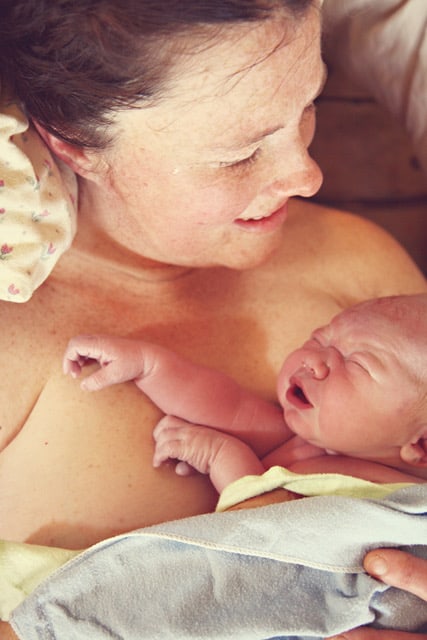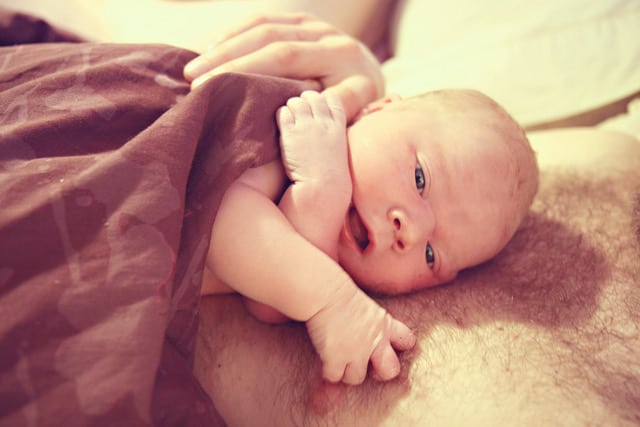

By Curt Peterson
It’s been over a month since Vermont governor Phil Scott declared a state of emergency (March 13) and a month this week since he made the “Stay Home, Stay Safe” order (March 24) to inhibit the spread of Covid-19, making a significant change in everyone’s life.
Katie Williams of Quechee, eight-plus months pregnant, couldn’t change her delivery date to accommodate the coronavirus. But the environment around her was considerably altered, and adjust she must.
In an average month, there are 25 babies born in Rutland Regional Medical
Center. That would not stop this month despite the shut-down.
Though some did alter their plans. Katie and Duncan Pogue, her partner, had made an informed decision to have a home-birth at home on their farm — Katie is one of two community nurses serving the town of Hartland, and provides doula services to other mothers through Well Maiden Doula and Healing Services.
A doula assists a mother before, during and/or after birth with personal, physical, emotional and informational support.
Well Maiden’s Sarah Allen and midwife Meghan Sperry of Art of Birth Midwifery in Randolph were already planning to provide pre-natal, birthing and post-partum care as Katie gave birth, so they volunteered to self-quarantine for two weeks before the baby was due. This would allow them accompany Katie if a trip to the hospital became necessary.
Katie and Duncan, and Katie’s 8-year-old daughter Lila quarantined as well.
Skye Landis Pogue came into the world on March 27, weighing 10 lbs., 4 oz.
“I had a close personal relationship with my midwife and my doula,” Katie said, “And it was a beautiful, successful home birth.”
But two hours later Katie hemorrhaged. She, Skye and the team rushed to the Dartmouth-Hitchcock Medical Center Emergency Room. Sperry, a certified practical midwife and certified nurse midwife, is licensed to prescribe and carry medications and had been able to stanch the hemorrhage right away.
Katie said she already felt “dreamy” from giving birth, and found it surreal to be met by 6 people wearing protective suits and masks sprouting tubes, taking her temperature remotely from six feet away.
“I learned a lot,” she said. “I experienced a wonderful blend of the medical and home birth cultural narratives.”
But the anti-bleeding medication had inspired a fever. Doctors worried Katie and Skye might become septic. The infant was breathing fast. Could he have become infected in the uterus? they worried.
DHMC protocol suggested Katie and Skye should be separated during their stay at the hospital, that x-Rays and antibiotics were called-for, but she and her home-birth team successfully advocated to keep them together and to avoid tests and injections.
The urgency abated, and everyone returned to the farm to heal and recover, albeit in strict two-week quarantine again.
“It’s been three weeks now,” Katie said, “and I’ve been grieving the loss of my anticipated healing and restorative experience with relatives and friends around me.”
Katie’s and Duncan’s families are fairly close by, but during the quarantine period they couldn’t visit. Now the quarantine is over and their careful visits are comforting.
“Birth, like death, should be a rite of passage witnessed by the village,” she said. “In normal times people would come into the home, cook, clean, give physical comfort. That was missing. I couldn’t access that support from ‘my village.’”
Because schools are closed, Katie has also been providing home-schooling for Lila. During quarantine she and Duncan planted greens and herbs in solitude.
“I can’t imagine what having a baby under these conditions would be like for a 17-year-old having her first child. Everyone who is pregnant is scared. Providers are scared, too. It’s a confusing time for everyone,” Katie reflected. “In this situation we have to learn to trust each other in a whole new way.”
Midwife Meghan Sperry told the Mountain Times that she and her partner have assisted in seven births during the state of emergency, and have received an additional 30 inquiries about their services.
Even in a pandemic, life goes on.



